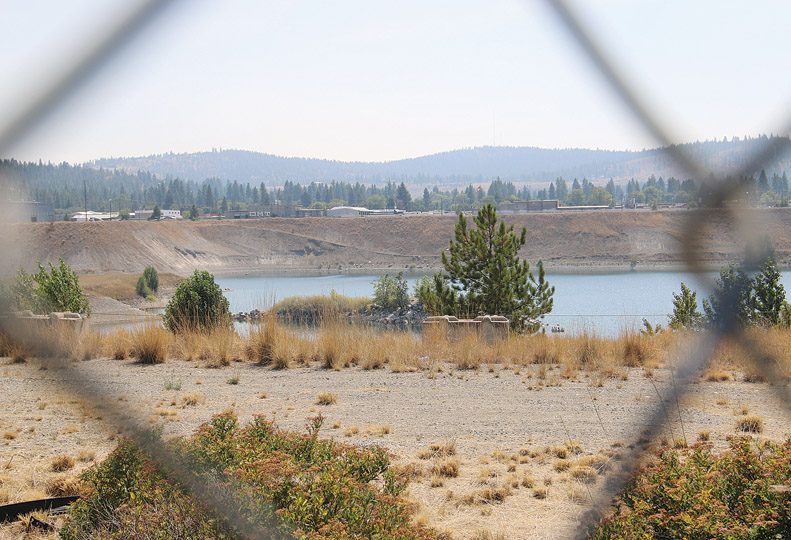
Home » Company challenges Valley mining moratorium
Company challenges Valley mining moratorium
City officials there remain committed to one-year ban

August 27, 2015
A concrete company here is challenging a mining moratorium that the city of Spokane Valley imposed in late February.
K.C. Klosterman, spokesman for the Northwest division of Spokane-based Oldcastle Materials, the parent company to Central Pre-Mix Development Corp., says the company filed an appeal on June 26 with Washington state’s Growth Management Hearings Board, seeking to overturn the moratorium.
A hearing is set for Nov. 12, and a final decision is scheduled for Dec. 23. Central Pre-Mix is located at 5111 E. Broadway in Spokane Valley. Klosterman says the city’s moratorium is having a financial impact on the company.
Klosterman says the company has been forced to put on hold part of a capital investment project that was scheduled to employ the use of a floating dredge at its mine just off Sullivan Road north of Interstate 90. Klosterman wouldn’t disclose the estimated financial setback the company has experienced as a result of the moratorium.
The company uses the open-pit mine for the extraction of gravel.
The city’s moratorium doesn’t apply to existing mining or mining site operations. However, it does prohibit new applications for mining and related mining site operations, such as excavation, mineral product manufacturing, mineral processing, and stockpiling.
Only two of six mines in Spokane Valley currently are being used, Klosterman says. The remaining mines are no longer in operation, and are in the process of being transitioned to residential use. “It’s a small footprint of activity. We still don’t understand the rationale for the moratorium,” he says.
Erik Lamb, deputy city attorney for Spokane Valley, says the moratorium was implemented to give the city a chance to examine mining as it prepares its 2015 Comprehensive Plan.
“It was done to give the city time to develop an appropriate regulatory approach to mining,” Lamb says. “By law, the city is required to designate mineral resource lands for protection. And in the city, and throughout Spokane County, there is a bountiful amount.”
The city adopted its first Comprehensive Plan in 2007, and it has updated the plan annually. However, the plan did not—and currently does not—specifically discuss or address mining or mineral resources as it relates to state law.
Despite the opposition expressed by some mining industry officials at an Aug. 11 meeting of the Spokane Valley City Council, the city says it has no intention of lifting the one-year ban before February 2016.
“Mining is unique, and compared to many other ways land is used, it has an impact on the surroundings. Noise, dust, it’s a pit in the ground,” Lamb says.
Spokane Valley began its 2015 Comprehensive Plan update earlier this year. As part of that process, the city is reviewing existing land inventory and all existing and desired land uses. One of those is the industrial zone, which includes gravel mining as an allowed use.
However, John Shogren, vice president and general manager of Central Pre-Mix, argues the moratorium isn’t compliant with state land use laws.
“Placing a moratorium against a natural-resource operation within the city’s boundaries does not conform to the requirements to protect and develop aggregate resources per the Growth Management Act and places the city in noncompliance with those goals,” Shogren says in a written statement he presented to the council at its Aug. 11 meeting.
Shogren also argued that the moratorium isn’t a good economic decision for the city. Aggregate in the form of crushed rock, concrete, block, pipe, or asphalt is at the foundation for all economic growth, whether in streets, bridges, buildings, water and sewer systems, or general residential development, he asserts, adding, “It all starts with aggregate,” the letter says.
Without the ability to secure new applications for mining due to the moratorium, aggregate that can’t be gathered from within the city has to be hauled in from other locations. For every 20 miles round trip of additional haul, you double the cost of the material, Shogren said. Spokane County has a total of almost 50 mining pits, Shogren says in the letter.
“The largest consumer of aggregate materials are governmental agencies, including the city,” Shogren says in the letter. “Disallowing aggregate access within or near the use is essentially a tax increase on the citizens and development community.”
“One of the unique features of mining is the permanent impact on the land where it is sited,” the city says in a document posted on its website. “Once a mine is opened, the impacts of the mine on the land are usually irreversible even with appropriate reclamation planning. These impacts mean that the land may be permanently removed from other future available industrial uses, even after the mine closes.”
Latest News Special Report Real Estate & Construction Government
Related Articles
Related Products



